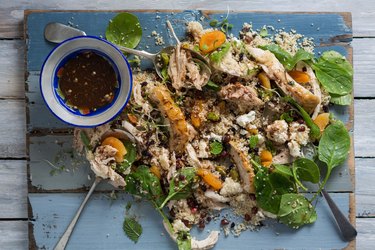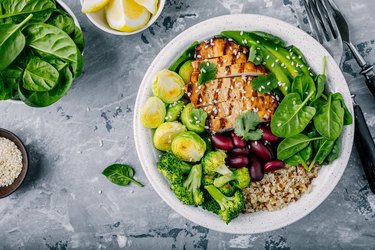
Aging is inevitable. That you can't change. But what you do have some power over is how well you do it. It all starts with what's on your plate.
For a top-notch dinner that gives your body what it needs well into your golden years, have some roasted chicken alongside veggies (of choice!) and farro (or another whole grain).
Video of the Day
Video of the Day
And if that just sounds like balanced eating, and you're surprised — or even a little miffed — because your jaw didn't hit the floor just now, remember that there's nothing wrong with getting back to basics.
Here's why this balanced meal is a must, according to top aging experts:
1. It’s Packed With Protein
A 3.5-ounce serving of rotisserie chicken breast has an impressive 28 grams of protein, per the USDA.
Getting enough protein is so important for aging well, James Powers, MD, professor of medicine in the Division of Geriatric Medicine at Vanderbilt University Medical Center in Nashville, Tennessee and a member of the American Geriatrics Society, tells LIVESTRONG.com.
"Your body uses protein to build new cells. If you don't get enough, your body will take it from your own muscle, which will make you weaker," Dr. Powers says.
Loss of muscle mass with age is a condition called sarcopenia, which can predispose you to falls that have devastating consequences.
This loss of muscle begins as early as your 30s, says Roger Fielding, PhD, of Tufts University, which is why no matter how old you are now, you've got to get protein on your plate.
What's more, protein may also have a beneficial effect on bone mass in the lumbar spine (the lower back area), notes a June 2017 review and meta-analysis in The American Journal of Clinical Nutrition. Maintaining bone mass as you age is important for decreasing your risk of osteoporosis.
"If you can slow down muscle and bone loss that comes with aging, you can maintain an active, healthier life," Dr. Powers says.
Peer into that crystal ball: Are you that grandparent who's actually running around with the grandkids? Are you that retired person who's jogging around the neighborhood every morning?
Your body needs 0.8 grams of protein per kilogram of body weight, Dr. Powers says, which translates into about 50 grams of protein per day for a 140-pound person. Ideally, this should be spread throughout the day.
Not into chicken — or any meat — really? No problem. There's nothing especially anti-aging about chicken, except that it's an easy source of lean protein and a little goes a long way (3.5 ounces is a small portion.) As a swap, go for vegetarian protein sources like beans, eggs or nuts, Dr. Powers says. Or opt for fish like salmon or cod.
And if you're running low on options, try other high-protein foods like ground turkey or tofu mixed in with meals.
2. It’s Bright in Color

There is a MyPlate for Older Adults developed by the Jean Mayer USDA Human Nutrition Research Center on Aging at Tufts University, and it's just like the dietary guidelines for Americans that younger adults follow. In that, half your plate at each meal should be fruits and veggies, and it's clear that that's good for you throughout your life.
This is what's called eating the rainbow.
"If you have colors on your plate, you'll have a wonderful diet," Dr. Powers says.
In fact, eating a balanced diet means you probably don't need to take a multivitamin supplement, as these foods are already packed with vitamins and minerals, he adds.
3. It’s Brimming With B Vitamins
Add whole grains to one-quarter of your plate, MyPlate suggests. This can be brown rice, whole-wheat pasta, quinoa, bulgur, whole-grain polenta or farro — whatever you enjoy and have a taste for that day.
Whole grains are important sources of B vitamins, notes the Whole Grains Council.
"As you age, you lose your body's reserve, and you don't have the bounce back ability you did when you were younger — and that's true of all your body's organs and systems," Dr. Powers says.
Making sure you're getting the vitamins you need will help you maintain function at an optimal level. He notes that some of the best foods for your brain have B vitamins, which are good for preserving cognition.
"These help maximize your brain's function," he says.
Cheers to entering your older years every bit of the firecracker you are today.
Try These 6 Chicken Recipes
- Turmeric Chicken with Lemon Radish Salad, from the blog Dishing Out Health
- Healthy Baked Chicken Nuggets, from the blog Eating Bird Food
- Healthier Chicken Marsala with mushrooms, from the blog A Beautiful Plate
- Chicken Cacciatore, from the Tastes Better From Scratch blog
- Easy Farro Mushroom Risotto (with chicken added), from the blog A Beautiful Plate
- Baked Barbecue Chicken from The Endless Meal blog
- USDA FoodData Central: “Chicken breast, rotisserie, skin not eaten”
- The Conversation: “Loss of muscle mass among elderly can lead to falls, and staying put during the pandemic doesn’t help.”
- The American Journal of Clinical Nutrition: “Dietary protein and bone health: a systematic review and meta-analysis from the National Osteoporosis Foundation”
- Jean Mayer USDA Human Nutrition Research Center on Aging at Tufts University: “MyPlate for Older Adults”
- Whole Grains Council: “What is a Whole Grain?”
- Dishing Out Health: "Turmeric Chicken with Lemon Radish Salad"
- Eating Bird Food: "Healthy Baked Chicken Nuggets"
- A Beautiful Plate: "Healthier Chicken Marsala"
- Tastes Better From Scratch: "Chicken Cacciatore"
- A Beautiful Plate: "Easy Farro Mushroom Risotto"
- The Endless Meal: "Baked BBQ Chicken"
Is this an emergency? If you are experiencing serious medical symptoms, please see the National Library of Medicine’s list of signs you need emergency medical attention or call 911.